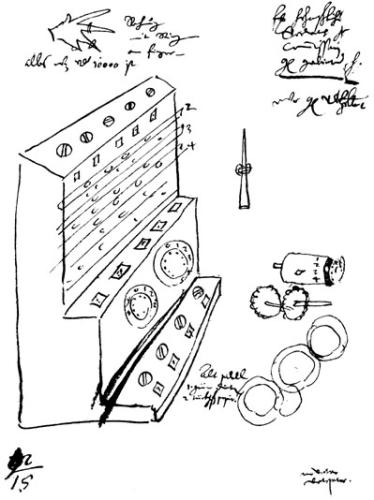Difference between revisions of "History of Computers - Wilhelm Schickard"
| Line 2: | Line 2: | ||
==Biography== | ==Biography== | ||
Schickard was born in the south German town of Herrenberg. He graduated from the University of Tubingen in 1609. Throughout his life, Schickard remained attached to the university first studying theology, and after 1619 as a professor. In 1631, Schickard moved from the languages to the astronomy department. During His time at Tubingen, Schickard carried out research in astronomy and mathematics. He was also a machinest, building among other things a calculation machine and a Hebrew grammar machine | Schickard was born in the south German town of Herrenberg. He graduated from the University of Tubingen in 1609. Throughout his life, Schickard remained attached to the university first studying theology, and after 1619 as a professor. In 1631, Schickard moved from the languages to the astronomy department. During His time at Tubingen, Schickard carried out research in astronomy and mathematics. He was also a machinest, building among other things a calculation machine and a Hebrew grammar machine | ||
| − | ===Calculating Clock | + | ===Calculating Clock http://upload.wikimedia.org/wikipedia/commons/c/c2/Rechenmaschine_wilhelm_schickard.png=== |
| − | http://upload.wikimedia.org/wikipedia/commons/c/c2/Rechenmaschine_wilhelm_schickard.png | + | |
Schickard is most well known today for the [[History of Computers - The Speeding Clock]]. He invented this machine while as a Hebrew Professor in 1623 in order to assist his good friend [[History of Computers - Johannes Keppler]] with astronomical calculations. This machine was one of the first mechanical calculators and proceeded the [[History of Computers - Pascaline]] by about 20 years. | Schickard is most well known today for the [[History of Computers - The Speeding Clock]]. He invented this machine while as a Hebrew Professor in 1623 in order to assist his good friend [[History of Computers - Johannes Keppler]] with astronomical calculations. This machine was one of the first mechanical calculators and proceeded the [[History of Computers - Pascaline]] by about 20 years. | ||
===Other Achievements=== | ===Other Achievements=== | ||
Revision as of 09:16, 1 September 2009
Whilhelm Schickard(4/22/1592-10/24/1635) was a German inventor and mathematician. He is best known for his invention the History of Computers - The Speeding Clock
Contents
Biography
Schickard was born in the south German town of Herrenberg. He graduated from the University of Tubingen in 1609. Throughout his life, Schickard remained attached to the university first studying theology, and after 1619 as a professor. In 1631, Schickard moved from the languages to the astronomy department. During His time at Tubingen, Schickard carried out research in astronomy and mathematics. He was also a machinest, building among other things a calculation machine and a Hebrew grammar machine
Calculating Clock 
Schickard is most well known today for the History of Computers - The Speeding Clock. He invented this machine while as a Hebrew Professor in 1623 in order to assist his good friend History of Computers - Johannes Keppler with astronomical calculations. This machine was one of the first mechanical calculators and proceeded the History of Computers - Pascaline by about 20 years.